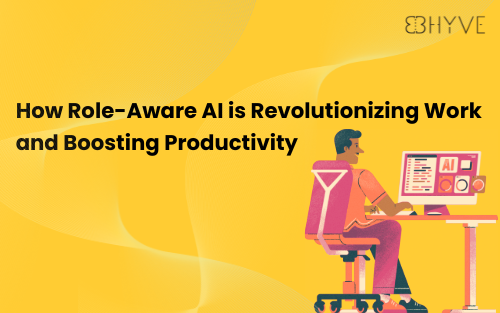How Role-Aware AI is Revolutionizing Work and Boosting Productivity

The way we work is constantly evolving, and the latest catalyst for change is an advanced form of artificial intelligence that doesn't just process data—it understands its purpose. This is Role-Aware AI, and it's fundamentally changing how we get things done, making our tasks faster, smarter, and more effective.
What is Role-Aware AI?
Think of Role-Aware AI as a specialized team member, not just a generic tool. Unlike traditional AI models that are trained on broad datasets, Role-Aware AI is an architecture where individual AI agents are assigned distinct, specialized roles. Each agent is meticulously fine-tuned to excel at a specific function, objective, or environment.
Examples of specialized AI roles include:
-
Data Analyst AI: Dedicated to data mining, cleaning datasets, and running predictive models.
-
Language Agent: Expert in Natural Language Processing (NLP) to summarize reports or draft responses.
-
Compliance AI: Constantly monitoring transactions and documents against regulatory standards.
-
Coordinator Agent: The project manager of the AI team, overseeing task assignment and communication between agents.
While many AI users are already familiar with role prompting - telling an AI to "Act as a brilliant mathematician" or "You are a food critic" - Role-Aware AI takes this concept to the next level. These are agents or bots that are built from the ground up to embody a specific role, such as a sales agent, a customer service representative, or a personal fitness coach, allowing them to perform tasks with near-human precision and nuance.
By assigning these responsibilities, AI systems can work together like a synchronized human team, leading to a more modular, scalable, and collaborative workflow.
How Role-Aware AI Differs from Traditional Models
The evolution from traditional AI to Role-Aware AI represents a significant shift in design and capability.
This evolution is a key foundation of Agentic AI, where systems are no longer just passive tools but intelligent actors that reason, communicate, and plan. This involves major advancements in understanding context, handling complex situations, and navigating the nuances of human interaction, all leading to a more autonomous and sophisticated digital partner.
Key Benefits of Role-Aware AI in the Modern Workplace
Implementing Role-Aware AI isn't just a technological upgrade; it's a strategic move that delivers tangible benefits across the organization.
-
Task Automation Tailored to Roles
Role-Aware AI automates repetitive or low-value tasks that are specific to a job, freeing up employees to focus on complex, creative, and strategic work. For a support representative, this could be an AI bot handling common customer queries. For a data analyst, it might be an agent that automates report generation. -
Enhanced Contextual Assistance
These intelligent agents don't just wait for instructions; they anticipate your needs. A marketer's AI, for instance, might proactively present campaign insights before they even ask. This deep understanding of workflow context allows for faster decision-making by providing relevant data, tools, and next steps without the need for constant, repetitive inputs. -
Improved Collaboration and Communication
AI agents can act as seamless coordinators, managing role-specific communications, reminders, and handoffs. Imagine an AI summarizing meeting notes and automatically assigning action items to the relevant team members, ensuring a smoother, more efficient workflow. -
Personalized Training and Skill Augmentation
Role-Aware AI can act as a personal coach, providing customized learning resources and just-in-time coaching aligned with an employee's specific role and skill gaps. This accelerates onboarding and fosters continuous skill development, creating a more agile and knowledgeable workforce. -
Data-Driven Decisions with Real-Time Insights
By analyzing vast, role-relevant datasets, AI can deliver actionable, role-specific insights in real time. Sales representatives can get instant customer data to close a deal, while a finance team can receive instant risk assessments, speeding up strategy and operations. -
Increased Productivity and Efficiency
The combined effect of automation, contextual support, and personalized insights leads to a significant boost in work speed and quality. Recent data shows that AI-powered customer support agents can handle 13.8% more inquiries per hour while simultaneously improving the quality of their service. This is the direct result of an AI that truly understands its role.
Challenges and Future Outlook
While the benefits are clear, the adoption of Role-Aware AI comes with its own set of challenges. Organizations must address critical issues like
-
Data privacy and security while integrating with other enterprise systems. Companies need to be sure that the right vendor will ensure complete protection of their data, proper architecture for data recovery, protection from trojans and other hacks, or data leaks to third parties.
-
Data structures and data hygiene for feeding these role-specific agents. Their success highly depends on them getting the right enterprise data to work on. Without that, no matter the level of sophistication of the AI, the exercise will not succeed
-
Access controls for employees working with these role-aware agents so the right agents is working hand in hand with the right employees. Agents cannot differentiate between employees and so internal guardrails need to be established for the enterprise to deploy right agents in the right departments
The need for continuous model training to keep up with evolving job roles and a proactive approach to avoiding bias are also crucial considerations.
Looking ahead, Role-Aware AI is set to become an integral part of the digital workforce, collaborating with humans in a more autonomous and sophisticated manner. As this technology matures and integrates with advanced Agentic AI and Multimodal AI, we can expect an explosion of productivity gains that will redefine the future of work.
Role-Aware AI isn't just about making work easier- it's about making it faster, smarter, and more aligned with the people who do it. Welcome to the future of work, where your AI doesn't just help you, it understands you.